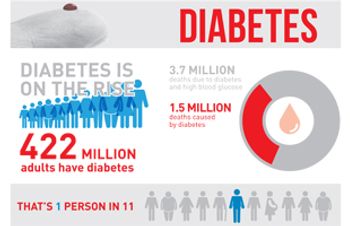
Oncology
Latest News

Latest Videos

More News

Two abstracts at the 59th Annual Meeting of the American Society of Hematology in Atlanta, Georgia found that CTL019 shows promising potential in providing significant benefit and cost effectiveness for pediatric and young adult patients with B-cell acute lymphoblastic leukemia in both the United States and the United Kingdom.

Three studies presented at the ongoing 59th Annual Meeting and Exposition of the American Society of Hematology in Atlanta, Georgia, shared progress on the oral Bruton’s tyrosine kinase inhibitor, ibrutinib, in the treatment of relapsed/refractory mantle cell lymphoma (MCL) and as a single agent in chronic lymphocytic leukemia (CLL).

During a session on the first day of the 59th Annual Meeting and Exposition of the American Society of Hematology in Atlanta, Georgia, physicians shared current knowledge on cardiovascular toxicities of tyrosine kinase inhibitors (TKIs) as well as the potential for treatment-free remission with these agents.

A University of California San Diego School of Medicine and Moores Cancer Center research team studying new drugs that could break resistance to cancer immunotherapy has received a 3-year, $600,000 translational grant from the V Foundation for Cancer Research.

Novartis announced that Phase III MONALEESA-7 trial results showed that the combination of ribociclib with an endocrine therapy (tamoxifen or an aromatase inhibitor) and goserelin yielded significant progression-free survival when compared with endocrine therapy and goserelin alone.

WIth different societies and organizations releasing contrary guidelines around breast cancer screening, experience with past patients or friends and family members could influence physicians' decisions around when to start screening mammography.

A Samfund grant recipient narrates her experience of being diagnosed young with cancer and how the support from The Samfund "made everyday school and life manageable."

A new study published Monday by scientists at the University of Massachusetts Medical School (UMMS) in Boston reports findings on a gene that is responsible for creating a protein that may help melanoma to grow and metastasize.

A systematic review of the FDA’s Adverse Event Reporting System (FAERS) found elevated reporting for both tofacitinib (Xeljanz) and ruxolitinib (Jakafi) for thromboembolic adverse events (AEs), suggesting the possibility of a class-wide issue with Janus kinase (JAK) inhibitors.

Health information brand Healthline launched its “State of…” series with its “State of Cancer” study, analyzing how digital information influences patient treatment decisions and recognizing generational differences.

The FDA has approved Foundation Medicine's FoundationOne CDx, the first-of-a-kind comprehensive companion diagnostic test for solid tumors. The test looks for hundreds of cancer genes, providing healthcare professionals with a more complete picture of what's causing tumor growth and guidance for treatment decisions.

A study published Thursday in JAMA Oncology found that improvements in survival among California cancer patients were almost exclusively limited to patients with private or Medicare insurance.

A panel on the importance of clinical and non-clinical stakeholders in a patient’s care trajectory brought together a diverse group of stakeholders at The American Journal of Managed Care®’s Patient-Centered Oncology Care® meeting.

Liver and endometrial cancer accounted for high numbers of new cases; increases of these cancer types have been attributed to rising rates of diabetes and obesity.

After a year-long process, Shawnee Mission Health (SMH) is now a certified member of the MD Anderson Cancer Network, the top ranked cancer center in the US. The 2 will work together to raise the standard of cancer care in the Kansas City metropolitan community through patient-centered care.

While African Americans are 3 times more likely than Caucasians to be diagnosed with multiple myeloma (MM)—and twice as likely to die of the disease—they are underrepresented in MM disease research.

A study published in CA: A Cancer Journal for Clinicians found that 42% of all incident cancer cases in US adults age 30 years or older in 2014 were attributable to potentially modifiable exposures. Exposures included smoking, alcohol intake, physical inactivity, and low fiber intake.








A study published in JAMA Oncology found that a significant number of patients newly diagnosed with cancer have had a prior cancer. The prevalence differed among age group and incident cancer type.














